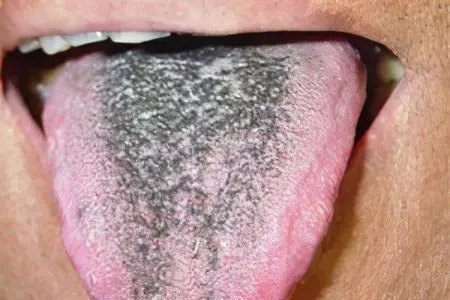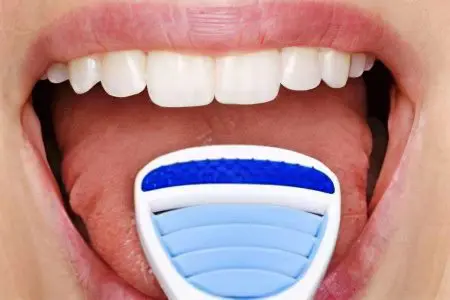Contents
Black coating on the tongue – this is the appearance of layers on the organ, having the appropriate color, different thickness, density and rigidity. It is known that normally the receptor organ should have a pink color. Therefore, the blackening of the surface of the tongue is a symptom that a pathological process is taking place in the body. Some time ago, doctors regarded the blackening of the tongue as a clear sign of cholera. With the development of medicine, it became clear that a plaque of this color may have other causes. According to statistics, men are more likely to suffer from black plaque on the tongue than women.
Causes of black plaque on the tongue

The reasons for the appearance of a black coating on the tongue can be distinguished as follows:
Consumption of products that have a coloring base. It can be lollipops, mulberries, blueberries, etc. Activated charcoal can also stain the tongue.
Violation of the acid-base environment of the body, which most often occurs due to excessive consumption of muffins, fats and carbohydrates, while completely ignoring plant products.
Intoxication of the body, which is chronic. As a rule, the tongue turns black when a significant amount of toxins accumulate in the blood.
Diseases of the digestive system. At the same time, in addition to black plaque, a person complains of a bitter taste in the mouth that appears in the morning.
Diseases accompanied by a prolonged increase in body temperature.
Chromogenic fungal infection.
Chronic alcoholism.
Chemical poisoning.
Stomach ulcer.
Diets compiled by a non-professional, with the wrong selection of products.
Cholestasis (congestion in the gallbladder) and calculous cholecystitis. Often at the same time, the tongue becomes not just black, but yellow-black.
Crohn’s disease.
Increased content of melanin in the mucous membranes.
Dehydration of the body.
The use of narcotic drugs.
In childhood, the cause of the appearance of black plaque on the tongue may be too early introduction of complementary foods. If the child’s tongue turns black, then his body is not ready to cope with new food and he needs support in the form of preparations containing bifidobacteria. At an older age, the causes of the appearance of black deposits on the tongue in children are diseases of the digestive system.
Symptoms of black plaque on the tongue
Black plaque is a symptom of a particular disease or inflammatory process occurring in the body.
It is worth paying attention to the following signs that characterize the appearance of black plaque:
His hue. It can vary from blue-black to light black, may have a slightly yellowish or brown color.
Flight zoning. Overlays can be located both over the entire surface of the tongue, and in its center, closer to the root or tip of the organ.
substrate mobility.
Relief of the tongue surface.
The presence of other formations, in the form of ulcers, abscesses, acne, etc.
The presence of an unpleasant sour smell from the mouth.
Having a bitter taste.
All these symptoms allow us to more accurately establish the cause that led to the formation of a black coating on the tongue.
In addition, much depends on the type and shape that the plaque has. If it is present in the form of small black dots, then this indicates a fungal infection of the oral cavity, an exacerbation of chronic diseases of the digestive organs, or lead poisoning of the body (in addition to this, the gums are covered with a black border, a metallic taste appears in the mouth).
If the black plaque has the form of a large spot, then this indicates gastrointestinal problems, an exacerbation of chronic diseases, the development of complications after serious infections, and infection of the urinary tract.
Treatment of black plaque on the tongue

Black deposits rarely appear on their own and are not caused by any disease. Therefore, if they are not removed with a brush or reappear after a short time, you should seek the advice of a doctor. He will help determine the cause that caused its formation, and prescribe the appropriate treatment. This may be the stabilization of the intestinal microflora with the help of preparations containing bacteria, the removal of existing inflammation in the digestive organs, etc.
Sometimes it is enough to review the diet and lifestyle in general, including the rejection of bad habits. Do not forget about taking a complex of vitamins, but only as directed by a doctor.
The drinking regime is important. This is especially true in the complex therapy of intoxication of the body. At the same time, at least 2 liters of clean water should be consumed per day.
You should not self-medicate, because black plaque can be a manifestation of serious diseases, for example, Crohn’s disease. It, in turn, requires the use of hormone-containing drugs, in combination with antibacterial therapy and course administration of immunosuppressants.
To find out the cause of the appearance of black overlays on the tongue, you should contact your dentist or therapist. Having studied the problem, the doctor can either prescribe therapy on his own, or redirect the patient to another specialist, for example, a gastroenterologist, endocrinologist, etc.
If a black plaque appears, which is caused by improper oral hygiene, the following recommendations will help:
Cleaning the tongue with a soft brush. In this case, movements should go from the root of the tongue towards its tip. They should be light, without the application of force.
Rubbing the surface of the tongue with 5 or 10% resocine solution. It has a disinfectant, astringent and cauterizing effect. Promotes stimulation of regenerative processes, in this case it is used as an antiseptic. However, it is worth remembering the contraindications that this remedy has, so you should consult your doctor before using it. Prohibited for use in children.
Salicylic alcohol can be used as a disinfectant, which should be wiped on the tongue several times a day.
These methods are effective if plaque forms with inadequate oral hygiene. Only a doctor can determine the exact cause.









